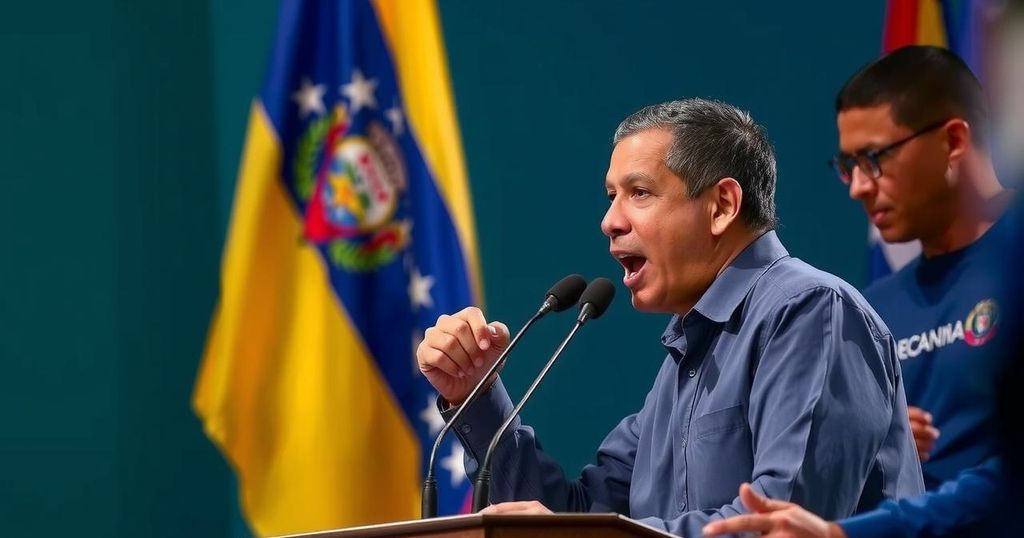Venezuelan opposition leader Maria Corina Machado has called on Colombia’s President Gustavo Petro to recognize her faction’s electoral victory in the disputed July elections. In a Senate address, she urged for decisive action against Nicolás Maduro’s regime, citing the need for international support. Despite Maduro’s declaration of victory, Machado’s coalition claims to have obtained contrary vote tallies. The regional implications of Maduro’s continued rule are concerning, particularly for Colombia, where criminal guerrilla groups thrive due to the instability. Machado remains in hiding, emphasizing the necessity for solidarity and support against government repression in Venezuela.
Maria Corina Machado, the prominent Venezuelan opposition leader, has publicly appealed to Colombia’s President Gustavo Petro to formally acknowledge her faction’s proclaimed victory in Venezuela’s contentious presidential election held in July. During a virtual address to the Colombian Senate, Machado underscored the urgency for international pressure against the current Venezuelan government led by Nicolás Maduro, expressing a desire for him to relinquish power by January. Having faced considerable risk of arrest, Machado has been in hiding for the past two months. She implored President Petro, stating, “It is time for decisions. Silence is no longer an option in the face of what is happening in Venezuela.” Machado articulated her anticipation for a transitional government, willing to engage in constructive negotiations whilst respecting the will of Venezuelan citizens expressed in the elections. Despite the electoral authorities, aligned with Maduro’s administration, declaring him the winner immediately after the polls closed, results remained sparse due to a claimed hack of the vote tally website. In contrast, Machado’s coalition managed to obtain and publicize results from over 80% of voting machines, which indicated a significant victory for opposition candidate Edmundo González. During her address to Colombian senators, Machado called for their support, declaring their role as essential in the quest for governmental change: “I ask you to be guarantors of our victory and to be the voice of those of us who today are facing the most atrocious and ruthless repression.” She condemned the subsequent actions by Maduro’s government, including arbitrary detentions and reports of torture against minors. Machado also presented a cautionary note regarding the broader implications of Maduro’s continued governance, which she suggested has rendered Venezuela a refuge for Colombian guerrilla groups, complicating President Petro’s peace initiatives aimed at stabilizing Colombia since his inauguration in 2022. In concurrent diplomatic efforts, both President Petro and other regional leaders attempted to mediate the electoral crisis but found limited success, as Maduro fortified his position through cabinet reshuffles and the incarceration of numerous dissenters. Edmundo González, facing an arrest warrant for his role in exposing the election results, sought refuge in Spain. With Maduro’s regime affirming its role as a facilitator in peace dialogues concerning Colombian rebel factions, ongoing negotiations have met significant hurdles, particularly with the National Liberation Army, causing these initiatives to lose momentum. As the next presidential term in Venezuela approaches on January 10, Machado persists in her endeavor to galvanize international support against Maduro’s regime while continuing to prioritize her personal safety.
The political landscape in Venezuela has been marked by instability and contentious electoral processes, particularly since Nicolás Maduro assumed the presidency. The July presidential elections were rife with claims of fraud and electoral misconduct. The opposition, represented by figures such as Maria Corina Machado and Edmundo González, has continuously sought international validation and support to challenge Maduro’s authority. The complicating factor of Colombia’s own internal strife, particularly with guerrilla groups, further intertwines the fates of these two nations, creating a complex regional dynamic that affects both domestic and foreign policies.
In summary, Maria Corina Machado’s urgent request to Colombia’s President Gustavo Petro to acknowledge the opposition’s electoral victory highlights the ongoing struggle for democratic governance in Venezuela against the backdrop of a repressive regime led by Nicolás Maduro. The opposition’s quest for legitimacy, juxtaposed with the challenges faced by Colombia in addressing its peace agenda, underscores the critical need for international diplomacy and support in navigating this turbulent political landscape. As the new presidential term approaches, the paths of both nations remain inextricably linked, with implications that resonate beyond their borders.
Original Source: www.oneindia.com






